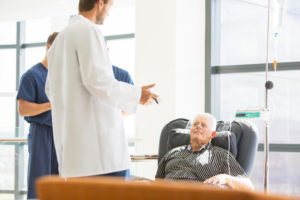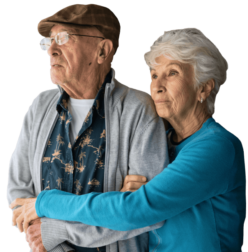Chemotherapy for Lung Cancer
Chemotherapy uses anti-cancer drugs to kill cancer cells. Many lung cancer patients will receive chemotherapy treatment. Doctors may also prescribe additional types of treatment, such as surgery and radiation therapy, for patients to receive alongside chemotherapy. Learn more about chemotherapy for lung cancer, what to expect from treatment, and more.
How Lung Cancer Chemotherapy Is Used
Chemotherapy is one of the most widely used lung cancer treatments. Oncologists (cancer doctors) often use it in various stages of treatment. It can be used by itself or in combination with other options as part of a multimodal treatment plan.
 Chemotherapy can be used before, during, or after other treatment procedures like surgery, immunotherapy, and radiation therapy to help patients live as long as possible.
Chemotherapy can be used before, during, or after other treatment procedures like surgery, immunotherapy, and radiation therapy to help patients live as long as possible.
For example, chemotherapy can be used before surgical procedures to shrink lung cancer tumors. This is called neoadjuvant chemotherapy. Chemotherapy used after surgery can lower the risk of cancer cells returning (recurrence) and is known as adjuvant chemotherapy.
Oncologists may also combine chemotherapy with radiation therapy (also called chemoradiation or chemoradiotherapy) to treat otherwise healthy patients in early stages of lung cancer.
Chemotherapy is an incredibly versatile treatment for lung cancer patients in both early stages and in advanced stages. However, some may be concerned about the cost of treatment.
Thankfully, if your lung cancer can be linked to asbestos exposure, you may be able to receive help paying for treatment. Learn how we can help with a free case review.
- Access Financial Aid and Justice
- Learn About Your Options
- Contact Us for Free

Chemotherapy for Lung Cancer Types
Which chemotherapy drugs will be used depends on the type of lung cancer a patient has, among other factors. Here’s a breakdown of chemo drugs for non-small cell lung cancer and small cell lung cancer (the two main types of lung cancer).
Non-Small Cell Lung Cancer
Non-small cell lung cancer (NSCLC) is the most common type of lung cancer.
Generally speaking, NSCLC is less sensitive to chemotherapy and radiation therapy than small cell lung cancer. Patients with lung cancer tumors that can be removed (resectable) may be treated with surgery and chemotherapy.
Doctors may use chemotherapy to improve the survival rates and quality of life for NSCLC patients with advanced (metastatic) disease.
Doctors may use the following chemo drugs by themselves or in pairs to treat NSCLC:
- Albumin-bound paclitaxel (Abraxane, nab-paclitaxel)
- Carboplatin
- Cisplatin
- Docetaxel (Taxotere)
- Etoposide (VP-16)
- Gemcitabine (Gemzar)
- Pemetrexed (Alimta)
- Vinorelbine (Navelbine)
Small Cell Lung Cancer
Small cell lung cancer (SCLC) is a type of lung cancer that spreads much faster than NSCLC.
Cancer care teams often use the following chemotherapy drugs to treat SCLC:
- Etoposide and cisplatin (or carboplatin)
- Irinotecan (Camptosar) and carboplatin
- Irinotecan (Camptosar) and cisplatin
- Lurbinectedin (Zepzelca) or topotecan (Hycamtin) for recurring SCLC
What to Expect From Chemotherapy Lung Cancer Treatments
Undergoing chemotherapy can be daunting, especially if you’ve never done so before. However, your care team can help describe each step of the process.
Doctors will likely prescribe a combination of chemotherapy drugs to be administered in cycles or rounds. A chemotherapy cycle involves a schedule for injection and recovery before repeating.
Here’s what you can expect from each part of lung cancer chemotherapy treatment cycle.
1. Chemotherapy Drugs Injection
The most common way chemotherapy is administered is through a needle into a vein (intravenous or IV) at a chemotherapy clinic, doctor’s office, or hospital setting.
The length of time for the injection may range from 5 minutes to over 8 hours, depending on the chemotherapy regimen.
Throughout the injection, the nurse will check your vitals and ensure the chemo drugs are being administered properly. You can use the injection time to eat, read, check out social media, sleep, relax, or work.
2. Rest Period
After the injection is finished, patients can return home to rest and recover. It is common for patients to experience side effects like nausea, loss of appetite, and hair loss during the rest period.
Don’t hesitate to talk to your doctor about any side effects. They may be able to prescribe medications to help ease side effects and improve recovery.
3. Next Chemotherapy Injection
After your recovery period, you will go back to your provider for the next injection cycle.
You will repeat this cycle until the end of your treatment plan.
How Long Does Lung Cancer Chemotherapy Last?
Depending on your health, the types of chemo drugs used, and your lung cancer stage and type, how long chemotherapy cycles are and how many cycles you receive will vary.
Some regimens may require treatment to be given daily or once a week followed by a period of rest that can be a few days or weeks to allow the body to recover.
Patients must also return for additional cycles.
Some lung cancer patients will receive between 4 and 8 cycles of chemotherapy.
Talk to your doctor to learn more about your chemo cycles and how to manage side effects.
If you are concerned about affording multiple rounds of chemotherapy treatment, Lung Cancer Group might be able to help. Get started with a free case review today.
- Access Financial Aid and Justice
- Learn About Your Options
- Contact Us for Free



Side Effects of Chemotherapy for Lung Cancer Patients
Because chemotherapy can damage healthy cells while killing cancer cells, it can cause side effects. Patients may experience side effects during, immediately after, or a few weeks or days after chemotherapy.
Common side effects of chemotherapy include:
- Constipation
- Fatigue
- Hair loss
- Loss of appetite
- Peripheral nerve damage
- Skin problems
- Sore throat and mouth
- Vomiting and nausea
Alternatives to Chemotherapy for Lung Cancer
Chemotherapy is effective and can increase life expectancies, and when combined with other treatments it can have even greater success. Treatment plans that incorporate multiple treatment options are called multimodal treatment plans.
Treatments commonly combined with chemotherapy in a multimodal plan include:
- Immunotherapy: Also known as immuno-oncology, this treatment uses special medications to help the body’s immune system target and eliminate cancer. Some of the common immunotherapy drugs block specific proteins present in cancer cells that protect it from an immune response.
- Surgery: If lung cancer tumors are large enough and if the patient is healthy enough, doctors may perform surgery to remove any visible tumors.
Doctors may also recommend alternative therapies, like yoga and massage, that can help ease symptoms and improve quality of life throughout treatment.
Lung Cancer Chemotherapy Drugs in Clinical Trials
Clinical trials are research studies involving human volunteers. Scientists use clinical trials to test the safety of new lung cancer chemotherapy regimens treatments.
Some chemotherapy drugs in clinical trials right now for lung cancer include:
- Crizotinib: A trial is studying how well crizotinib works in patients with early stage NSCLC that has been removed by surgery and has a mutation in the anaplastic lymphoma kinase (ALK) protein. This protein can make cancer cells grow quickly, and the goal is for crizotinib to stop growth by blocking the mutated protein.
- Durvalumab with chemotherapy and radiation therapy: Researchers are studying how well durvalumab, an immunotherapy drug, with radiation therapy and chemotherapy works in treating patients with stage III NSCLC that is unresectable (cannot be removed by surgery).
- Pembrolizumab: A clinical trial testing to see if this immunotherapy drug can help stage 4 lung cancer patients who haven’t gotten treatment yet. Patients will get pembrolizumab by itself first, and then a combination of carboplatin or pemetrexed and pembrolizumab.
Survival Rate After Chemotherapy for Lung Cancer
Lung cancer patients who receive chemotherapy tend to have higher survival rates, which refers to the amount of patients who survive beyond a certain time period.
In a 2019 study published in the International Journal of Clinical Oncology, researchers found chemotherapy alone increased 1-year survival to 29% compared to 20% for those who did not receive chemotherapy.
When chemotherapy is used alongside other treatments it can have even greater results on survival. For example, a clinical trial found that patients who received immunotherapy along with chemotherapy had a 5-year survival of 18.4%, nearly double the survival of those who did not receive the combination.
Get Help With Chemotherapy for a Lung Cancer Diagnosis
Undergoing chemotherapy for lung cancer can be daunting for patients and their loved ones. Although chemotherapy can extend survival, the cost of chemotherapy can leave it out of reach for many families who need it most.
If your lung cancer was caused by asbestos exposure, Lung Cancer Group can help you and your family find financial aid and justice. Our compassionate patient advocates and attorneys will do everything they can to connect you with helpful resources.
Call (877) 446-5767 or fill out our contact form to book a free case consultation.
FAQs About Chemotherapy for Lung Cancer
Can lung cancer be treated successfully with chemotherapy?
Yes. Chemotherapy is effective for early- and late-stage metastatic non-small cell lung cancer and small cell lung cancer.
Studies have shown that it can improve survival rates, especially when used in combination with other lung cancer treatment options.
How much does chemotherapy cost?
Without insurance, lung cancer treatment can cost up to $140,000, according to the American Cancer Society. However, the cost of chemotherapy will vary, depending on your lung cancer stage and type, insurance, veteran status, and other factors.
Our team may be able to help you pay for life-extending care if your lung cancer can be linked to asbestos. Contact us today to see how we can help.
How many sessions of chemotherapy do you need for lung cancer?
It varies. The number of chemotherapy sessions for lung cancer depends on your health, the lung cancer type and stage, and chemotherapy drugs used.
Talk to your cancer center team to learn more about your treatment options.
Will chemotherapy cure lung cancer?
There is no official cure for lung cancer, but chemotherapy can help cancer patients live longer. Doctors may call this progression-free disease or consider the cancer stable.

